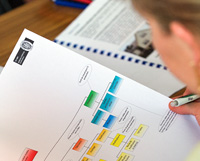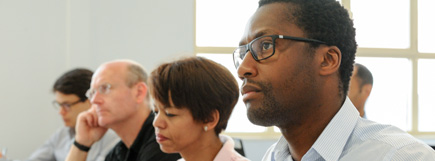Organization and Team Dynamics
Code UE : US1733
- Cours + travaux pratiques
- 4 crédits
Responsable(s)
Alexis POKROVSKY
Timéa CSASZAR
Public, conditions d’accès et prérequis
Master in Management MIM M2 group: Project Management & Business Engineering
Objectifs pédagogiques
Teamwork gets tasks done. However, what is a team? How does it function? What are the dynamics of a team? What does it take to be an effective team leader? This course teaches the characteristics of a well-functioning team and techniques for effective group decision-making. It looks at how to develop and adapt your own leadership style, how to set effective team goals, and how to implement strategies to secure the commitment of team members.
- Understand what is at stake in a group to optimise its efficiently
- Acquire the key concepts, and use them in creating and developing organisation
- Provide the skills for collective work in other disciplines
- Develop self-awareness through experiencing.
- Open to the mastery business team efficiency
- Develop analytical and critical understanding of work organisations
- Get ready for ethical leadership and transformational roles in business.
- Develop personal and interpersonal toolbox for group-working success.
Compétences visées
- Principles of group dynamics and development
- Dimensions of team member behavior
- Assessment of how effectively a team functions
Mots-clés
Contenu
Introduction to the objectives of the course
~ What it is, what it brings
~ Different approaches
Group communication and personalities
~ Processes of communication
~ Synergy or divergence
~ Global dynamic
The life of the group
~ Formation, cohesion, development
~ Interactions, affects, emotions
~ Conformity and mimetic processes
The structure of the group
~ Roles and dynamics
~ Power and influence
~ Conflicts within a group
The action of the group
~ Ambition, reasons of being and values
~ Setting up an action plan
~ Decision making and mistakes of decision making
Organisations and larger groups
~ A short outlook on the key organisation theories
~ What to apply in business / practical output
Organisations and complexity
~ What is complexity and why it is growing
~ How to handle complexity in work organisation
~ What it is, what it brings
~ Different approaches
Group communication and personalities
~ Processes of communication
~ Synergy or divergence
~ Global dynamic
The life of the group
~ Formation, cohesion, development
~ Interactions, affects, emotions
~ Conformity and mimetic processes
The structure of the group
~ Roles and dynamics
~ Power and influence
~ Conflicts within a group
The action of the group
~ Ambition, reasons of being and values
~ Setting up an action plan
~ Decision making and mistakes of decision making
Organisations and larger groups
~ A short outlook on the key organisation theories
~ What to apply in business / practical output
Organisations and complexity
~ What is complexity and why it is growing
~ How to handle complexity in work organisation
Modalité d'évaluation
Acquisition of methodological tools (in-class follow-up)
In-class participation
Professor’s discretion
Final examination
In-class participation
Professor’s discretion
Final examination
Cette UE apparaît dans les diplômes et certificats suivants
Rechercher une formation
CRITERES
- Le champ Mot-clé permet de rechercher les formations grâce à un mot ou à une expression présent dans l’intitulé ou dans les index d’une formation.
Des index vous sont suggérés à partir du 3e caractère saisi, mais vous pouvez aussi saisir librement tout autre chaîne de caractères . - les différents items sélectionnés sont croisés.
ex: "Comptabilité" et "Région Alsace"
CODE
- Vous pouvez utiliser le caractère joker * pour remplacer un nombre quelconque de caractères
- UE : le code comprend 3 lettres immédiatement suivies de 3 chiffres
- Certificat : le code comprend 2 ou 3 lettres immédiatement suivies de 3 chiffres. Certains certificats se déclinent selon plusieurs parcours :
- pour afficher le tronc commun, tapez le code simple (ex : LG005).
- pour afficher un parcours précis dans un diplôme, faites suivre le code de la lettre "p", et du numéro de parcours (ex : LG005p2). Si le diplôme ne comporte qu'un seul parcours, faites suivre la lettre "p" de -1 (ex : CYC17p-1).
Dans tous les cas, veillez à ne pas insérer d'espace ou de ponctuation supplémentaire.
Chargement du résultat...

Intitulé de la formation |
Type |
Modalité(s) |
Lieu(x) |
|
|---|---|---|---|---|
|
Lieu(x)
Initial
|
Lieu(x)
Paris
|
|||
|
Lieu(x)
Alternance
|
Lieu(x)
CFA
|
|||
Intitulé de la formation
Diplôme d'établissement Master of Science in Management Parcours Project Management
|
Lieu(x)
Package
|
Lieu(x)
Paris
|
||
| Intitulé de la formation | Type | Modalité(s) | Lieu(x) |
Contact
Cnam - IIM - EPN stratégies - Programmes Master in Management (MIM)
EPN15, 2 rue Conté bureau 31.2.31
75003 Paris
Tel :00 33 1 58 80 85 64
Sophie Le Liboux
EPN15, 2 rue Conté bureau 31.2.31
75003 Paris
Tel :00 33 1 58 80 85 64
Sophie Le Liboux
Voir le site
Voir le calendrier, le tarif, les conditions d'accessibilité et les modalités d'inscription dans le(s) centre(s) d'enseignement qui propose(nt) cette formation.
Enseignement non encore programmé
Code UE : US1733
- Cours + travaux pratiques
- 4 crédits
Responsable(s)
Alexis POKROVSKY
Timéa CSASZAR













